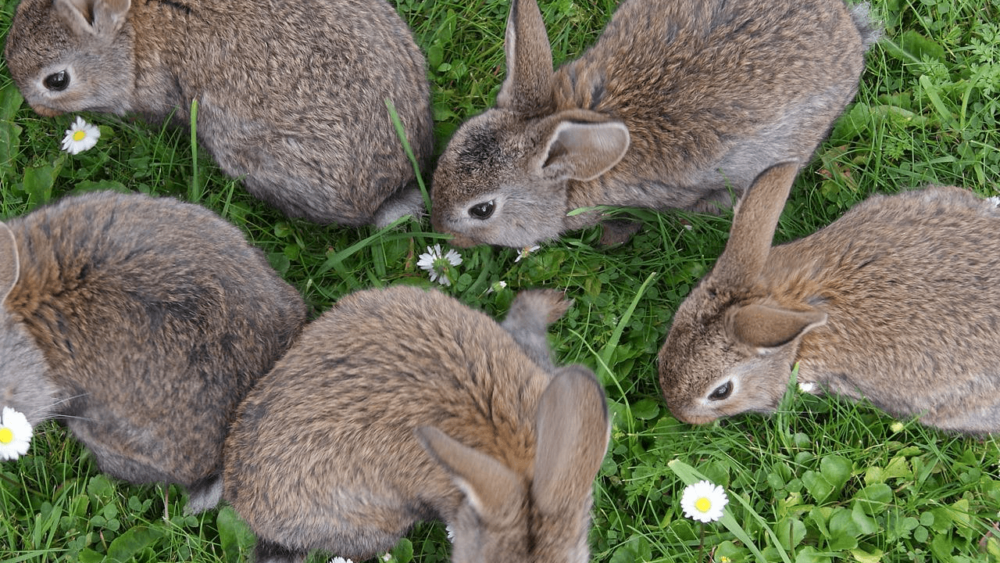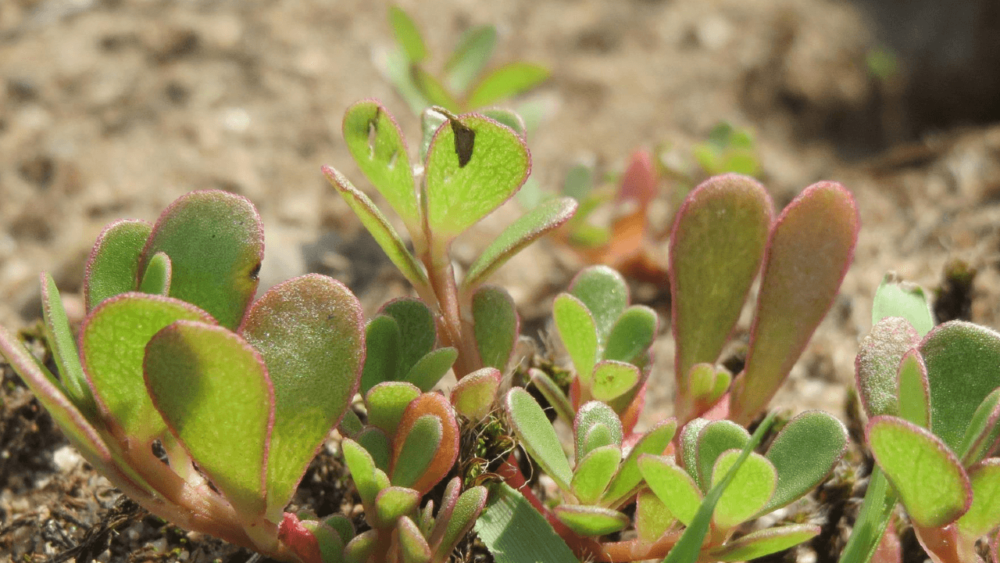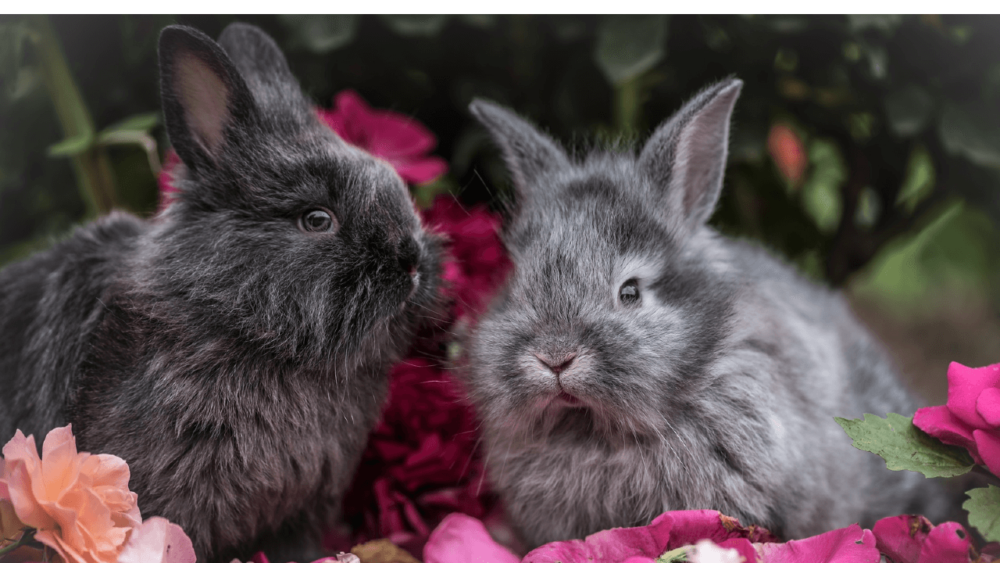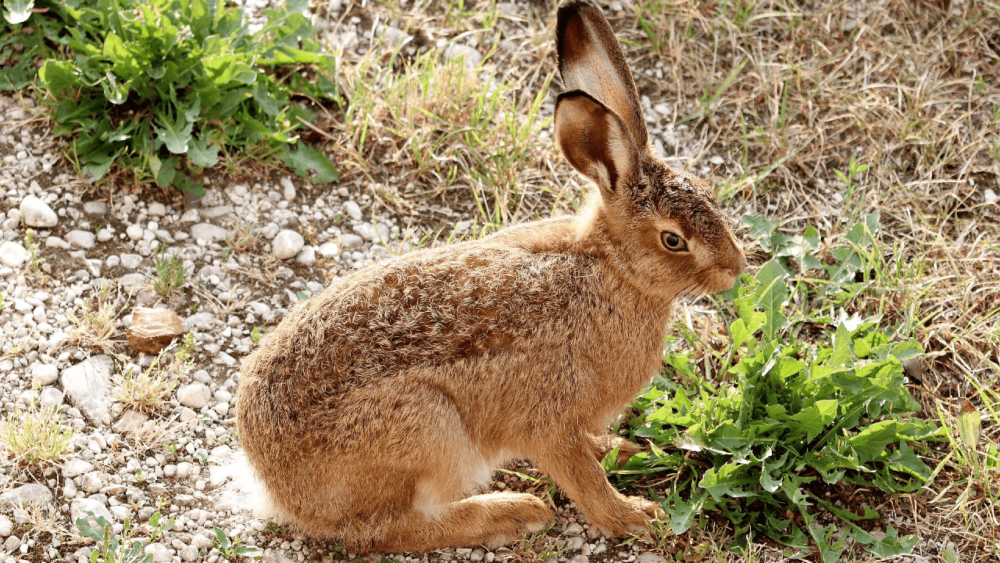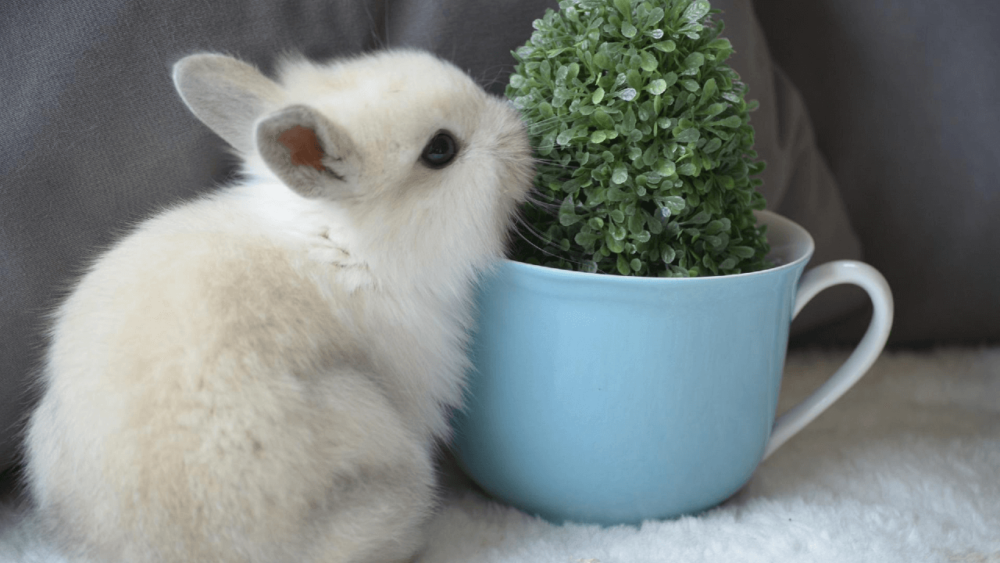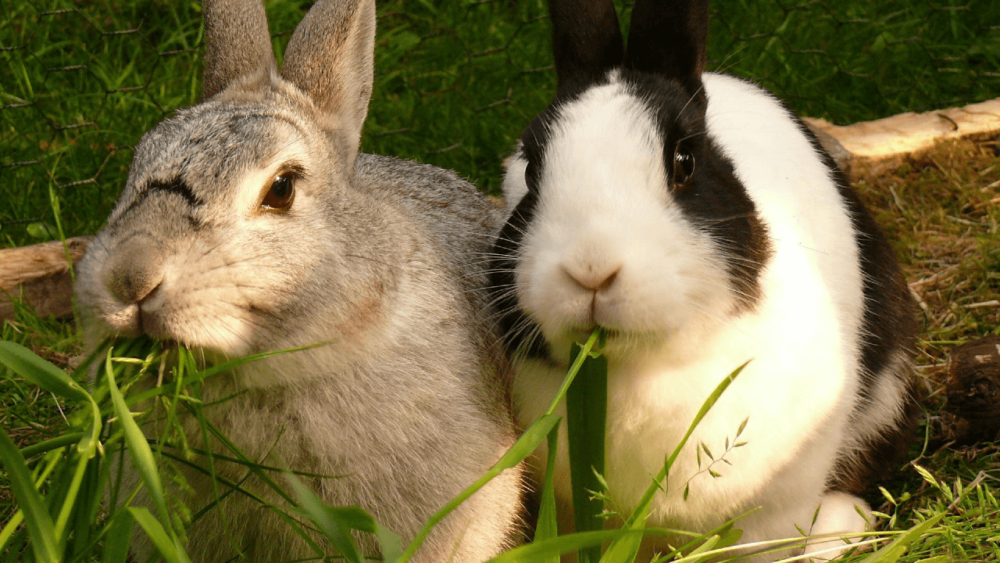Rabbits are fun, amazing animals. If you are lucky enough to have a pet rabbit, you want to keep it safe and healthy. You probably want to spoil it a little with healthy, and fun treats for it to eat.
Many of the vegetables, herbs, and plants around your house and yard are edible and nutritious for rabbits. But, some can be dangerous or even deadly. Understanding which foods you eat are also healthy for rabbits is essential.
Can My Bunny Eat The Same Foods As I Eat?
There are many foods that people eat that rabbits also eat. Many vegetables, fruits, and herbs are healthy for bunnies and people. But, rabbits should never eat processed foods or foods high in sugar or fat.
Rabbits have a different sort of digestive tract than humans. That means they get nutrients from their food differently than we do. Rabbits depend on good gut health, or they can’t get the proper nutrients from their food. They can’t digest fat at all, and they have a difficult time with sugar.
In fact, many types of sugars can wreak havoc on their gut bacteria and diminish how well they digest other healthy foods.
Let’s dive into common questions about what your rabbit can eat and what foods you should avoid feeding your bunny.
What Herbs Can Rabbits Eat Safely?
Rabbits can safely eat many herbs, including basil, cilantro or coriander, dill, oregano, parsley, peppermint, and other mints, rosemary, sage, thyme, and echinacea. You can feed your rabbit tarragon, lavender, lemon balm, comfrey, and clover in limited amounts. These herbs are healthy and safe for rabbits to eat and can be mixed with other greens or sprinkled dry on your rabbit’s hay.
Can Rabbits Eat Dried Herbs? Rabbits can eat sfe herbs dried or fresh. Dried herbs are sometimes easier to find and store, but your rabbits will also love the fresh herbs mixed in with their hay!
Herbs that are not safe for rabbits to eat include agave leaves, aloe, amaryllis, nutmeg, buttercup, jasmine, hogwart, hemlock, eucalyptus, bloodroot, lily of the valley, milkweed, mistletoe, poppy, ragwort, and bloodroot. Do not feed your rabbit cacti of any sort.
Can My Rabbit Eat Purslane?
Rabbits can eat purslane, but with care. Purslane contains oxalates, which can interfere with a rabbit’s ability to absorb nutrients over time. Purslane is higher in Omega 3 Fatty Acids than any other known vegetable, so it offers good benefits that can outweigh the negatives.
Not all rabbits enjoy this nutritious and abundant plant, though. Feed purslane with other leafy greens for a healthier snack. This will help your rabbit better absorb nutrients. Avoid feeding purslane with spinach, radish tops, mustard greens, swiss chard, or sprouts. All of these also contain oxalates, so other oxalate-free greens should be mixed with purslane.
Purslane is a succulent found across the United States, Africa, Europe, and the Middle East. It’s often found along sidewalks and is used as a ground cover. It’s becoming increasingly popular as a super food for people, and bunnies often enjoy eating purslane.
What Greens Can My Rabbit Eat?
Rabbits can eat most carrot tops, apple leaves, mustard greens, lettuce, spinach, turnip greens, bok choi, and chard. Certain greens are healthier for rabbits than other greens.
The healthiest greens for rabbits to eat include romaine lettuce, green leaf lettuce, red leaf lettuce, arugula, tatsoi, turnip greens, and carrot tops.
Your rabbit can also have limited quantities of clover, butterhead lettuce, turnip greens, and spinach. Mix these with other greens, so your bunny gets a good variety of vitamins and minerals.
Can My Rabbit Eat Cantaloupe?
Rabbits can eat cantaloupe in very limited quantities. Your bunny should consume no more than 1 TBS of chopped cantaloupe for every two pounds it weighs. And, it shouldn’t eat cantaloupe more than once or twice a week. Cantaloupe is high in sugar and is not healthy for your rabbit in a larger quantity.
Although cantaloupes have many vitamins, your rabbit will be healthier if you regularly feed it other vegetables that are lower in sugar.
Can Rabbits Eat Tatsoi?
Rabbits can eat tatsoi daily, which is a healthy leafy lettuce. Tatsoi is lettuce thats found in salad mixes at the grocery store. You don’t need to limit the number of days you feed your rabbit tatsoi as it’s low in sugar and high in vitamins.
Tatsoi should not be fed as a majority of your rabbit’s diet but can be fed as often as daily in combination with grass hay. Tatsoi is similar to a small bokchoi and mizuna.
Can Rabbits Eat Spinach Daily?
Rabbits can eat spinach but should not eat it daily. Spinach is not the best food for rabbits to eat. Spinach is high in oxalic acid. According to the University of California, oxalic acid interferes with a bunny’s ability to absorb other nutrients. It’s sort of an anti-nutrient for rabbits.
As a result, even though rabbits can eat spinach, they should not be fed spinach daily. Do not feed more than a small amount of spinach to your rabbit more than once or twice a week. If you feed your bunny spinach, feed it a smaller amount than you do other leafy greens.
Make sure you mix it with other leafy greens. Avoid leafy greenswith oxalates such as purslane, parsley, mustard greens, radish tops, beet greens, and swiss chard. Young spinach leaves have fewer oxalates than older, larger leaves. Fall spinach plants also tend to have lower oxalates than spinach grown in the other three seasons. Do not feed your rabbit frozen or canned spinach.
What Plant Leaves Can Rabbits Eat?
Your rabbits can eat dozens of plants, including many popular varieties of flowers, fruit tree leaves, many garden plants, and weeds. Rabbits can eat thistle leaves, pear leaves, and apple leaves. Rabbits can eat roses, leafy greens, carrots, radish tops, and purslane. For a more comprehensive list, check out these 80 foods your rabbit can eat and these foods they can’t eat.
Can Rabbits Eat Seeds?
Rabbits can eat seeds, but you should avoid feeding your rabbit seeds and nuts. There are two significant risks with seeds. Many seeds, or nuts, are high in fat. Rabbits can’t digest fats, which can negatively affect their digestive tract. Nuts and many seeds can tend to be large, which can be a choking hazard for rabbits.
If you feed your rabbits seeds, make sure that the seeds or nuts are small or chopped into smaller pieces. Do not feed rabbits seeds or nuts more than very occasionally. It would be far healthier to grab your rabbit a few dandelions from outside instead of feeding it seeds.
Can Rabbits Eat Cranberries?
Rabbits can eat cranberries in minimal quantities after they are seven months old. Never feed your rabbit cranberries more than once or twice a week. Only feed your rabbit one or two cranberries at a time and avoid feeding any other high-sugar treats at the same time (or on the same day)
Cranberries have higher amounts of sugar, so they should only be used as a treat. Feeding your rabbit cranberries in moderation is important to maintaining its health. Cranberries can hurt young rabbits who are younger than 6 or 7 months. They can also exasperate health issues in obese rabbits. Rabbits can eat fresh or dried cranberries.
What Flowers Can Rabbits Eat?
Rabbits can safely eat dozens of flowers and flowering plants and trees. Some of the most common flowers for rabbits to eat include daisies, hollyhocks, nasturtiums, violets, roses, cornflowers, clover flowers, pansies, marigolds, and morning glory. Dandelions, sunflowers, bell flowers, and jasmine are also edible.
Of those flowers, many of the entire plants are edible. Nasturtiums, hollyhocks, violets, roses, and daisies are entirely palatable to rabbits. Sunflowers tend to be higher in fat, so feed it to rabbits in moderation.
Can rabbits eat daisies and morning glory? Real morning glory is edible to rabbits, but common morning glory, also called bindweed is not edible. Bindweed is long and often grows wild as a cover plant that grows up everything around it and has small white or colored flowers. Real morning glory is a larger flower that is usually cultivated. If you aren’t sure which is is, don’t feed it to your rabbit.
Can Rabbits Eat Kiwi?
The kiwi skin is better for rabbits than the flesh of the fruit. Both kiwi skins and the fruit should be fed to rabbits in moderation because of the high sugar levels. Hardy kiwis and regular kiwis you buy at the store are ok for rabbits to eat in moderation. Seeds are also ok because of how small they are.
If you want to feed your rabbit kiwi, I’d recommend that you eat the kiwi fruit and give just the skins to your rabbit. It will still make a treat they will love but will be healthier than feeding the actual fruit to them. And, you’ll be able to reduce food waste when you eat kiwis. (If you eat them regularly through, compost the skins instead of feeding kiwis regularly to your rabbit).
Can My Rabbit Eat Rosemary?
Rabbits can eat rosemary, but only in moderation. Too much rosemary can give your rabbit diarrhea, which is a sign of poor rabbit digestion. Plus, many rabbits don’t like the taste of rosemary because it’s so strong. If you feed your rabbit rosemary, only feed a few sprigs a day to it.
Grass hay is much better for your rabbit than rosemary, so you could also consider just feeding your bunny, which makes it healthiest and strong!
Can Bunny’s Eat Basil?
Most rabbits can eat small amounts of basil without adverse side effects. But, basil is not the best thing to feed your bunny because of its high calcium and low fiber. Young bunnies (under 3 months old) should never be fed basil because their intestinal tracts are more sensitive.
Never feed your rabbit more than 1 or 2 stems of basil in a day. The leaves and stems can be eaten and aren’t toxic. But, too much basil can negatively affect your rabbit’s health.
Can Rabbits Eat Plantain?
Rabbits can eat plantain (the weed, not the fruit). Plantain helps spur a rabbit’s appetite and can be used for sick rabbits or underweight ones. It can help with diarrhea. Plantain is high in fiber, one of the most essential rabbit dietary needs. Plantain grows in poor, compacted soil and is considered a weed to most people.
Make sure that the plantain you pickis pesticide free. Pesticides or insecticides can make your rabbit ill. There are 19 types, including broadleaf plantain, narrow leaf, and ribwort.
What Wild Plants Can Rabbits Eat?
Rabbits can eat many native plants. Although native plants differe from region to region, there are some plants that tend to grow most places. These wild plants are ok for rabbits to eat:
- Wild roses
- Plantain (broadleaf and narrowleaf)
- Dandelions
- Grass
- Pansies
- Shasta daisies
- Chamomile
- Mint family
- Prickly lettuce
- Mallow
- Nettle
- Thistles
- Clover
- watercress
Best Plants to Grow For Rabbits
If you want to grow healthy snacks for your rabbits, here are a few options that you can incorporate around your yard and garden:
- Lettuces
- Daisies
- Roses
- Basil
- Rosemary
- Mint family
- Pumpkins
- Clover
- Grass
Can Bunny’s Eat Broccoli
Whether or not rabbits can eat broccoli is a little controversial. Broccoli can give rabbits gas, so you shouldn’t feed your rabbit very often. If your rabbit appears to handle the broccoli well and enjoy it, then you can feed it a little more regularly. Broccoli is not bad for rabbits, but the gas can be uncomfortable and painful.
Never feed a large quantity of broccoli to a rabbit at a time. I recommend only feeding small parts of the broccoli plant once a week or less frequently. All parts of the broccoli plant are considered edible including the stems, flowers, and leaves.
Can Rabbits Eat Clover?
Rabbits can eat clover, but large quantities of clover can cause gas. Fresh clover is more likely to cause gas issues than dried clover (which usually doesn’t cause gas). Young clover plants are also less likely to cause gas. All parts of the clover plants are edible for rabbits.
In the wild, rabbits often eat clover, especially as it’s usually part of a grass field. Your rabbit will also enjoy the clover leaves, sprouts, and flowers, but will be happier if the hay is twice as much grass as clover. Clover can also have a lot of sugar in it compared to grass. (It has less sugar than carrots though.)
Can My Rabbit Eat Dandelion FLowers?
Rabbits can eat dandelion flowers, stems, and leaves. Dandelions are very nutritious for rabbits and can be fed daily to your rabbit as a treat. Dandelions shouldn’t be fed to very young rabbits and shouldn’t be a major part of a rabbit’s diet, but can be fed daily to it.
Dandelions are one of those treats that also helps you get rid of the weeds in your yard by feeding your rabbits. If you let your rabbit out to play on your lawn, you’ll notice it will quickly start enjoying both the grass and dandelions.
Can Bunny’s Eat Pumpkin?
Rabbits can eat pumpkins, but bunnies should not be fed pumpkins because of its high sugar content. Even mature rabbits should only be fed a very limited amount of raw, chopped pumpkin. Pumpkin has many vitamins, but rabbits can produce most of those vitamins from hay. Pumpkins have some fiber, an essential component for rabbits, but not as much as hay. The skin of a pumpkin is healthier for rabbits than the fruit. Don’t feed your rabbit pumpkin more than once or twice a week. Avoid feeding your rabbit cooked, canned, or frozen pumpkins as those are not as good for rabbits.
Can Rabbits Eat Auberdine (Eggplant)?
Rabbits can usually tolerate the eggplant fruit without any issue. The fruit is not toxic to rabbits. But, NEVER feed your rabbit any part of the aubergine plant including the stems or leaves. The plant is highly poisonous and can seriously harm your rabbit.
Eggplant has fiber but is also high in sugar. Rabbits can’t easily digest sugar because it upsets their digestion, which uses fermentation to extract nutrients from food. High-sugar foods change the types of bacteria in their gut and can overwhelm the necessary strains of good bacteria. As a result, never feed your rabbits more than one or two small servings of eggplant a week.
Can Rabbits Eat Chicken?
Rabbits should never be fed chicken or any other meat. Because they are herbivores, their system cannot handle meat, cooked or raw. Feeding your rabbit chicken can make it very ill and might kill it. Rabbits ferment their food as part of digestion, and fermented meat becomes deadly. Plus, rabbits cannot digest fat, so meat possesses additional health issues.
Please, don’t feed your rabbit meat ever. It probably won’t eat it if given a choice, but sometimes people try to disguise foods so rabbits will eat them. Let your rabbit have a go at weeds you can find in your area.
Can My Rabbit Eat Catnip?
Rabbits can eat catnip, but most rabbits will avoid eating it because of its strong fragrance and taste. Even wild rabbits, often more desperate for food sources, don’t usually eat catnip. If your rabbit does happen to enjoy catnip, feed it sparingly and continue to feed most of its food in hay. Grass hay is the best food for rabbits.
Can Bunny’s Eat Chicory?
Chicory is often confused with endive, which is closely related to chicory. Rabbits can eat chicory as part of their leafy greens. The roots of chicory are incredibly high in calcium, oxalate acid, and phosphorus. Don’t feed chicory roots to rabbits more than one to two times a week. Too much calcium or oxalates can cause ill effects on your rabbits. Oxalates prohibit rabbits from absorbing helpful nutrients.
Can Rabbits Eat Chinese Leaf?
Rabbits can eat Chinese leaf as part of their daily leafy greens treats. The darker the leaves, the more nutritious they are. Chinese leaf is often mixed in with other salad mixes. There is some confusion online about Chinese leaf versus Chinese cabbage. Chinese cabbage is a specific type of cabbage and is edible to rabbits. The Chinese leaf is a type of lettuce that rabbits can eat and digest.
Can Rabbits Eat Tomato?
Although rabbits can technically eat tomatoes, they are not suitable for rabbits. Tomatoes aren’t toxic to rabbits, but the leaves and stems are toxic. Never feed any part of the tomato plant to your bunny. You could feed your rabbit a little bit of the tomato fruit, but only in small quantities.
Tomatoes are high in sugar, which negatively affects the microorganisms in your bunny’s digestive tract. Tomatoes also miss many key nutrients that rabbits need and offer no fiber.
Fruits Rabbits Can Eat Fruit?
Rabbits shouldn’t eat fruits frequently because of the high levels of sugars found in most fruits. Some fruit plants are healthy for rabbits, such as apple leaves or other fruit tee leaves.
But, if you want to share a small amount of fruit with your bunny occasionally, the following fruits won’t harm or poison your bunny. They are safe to eat and healthy if fed occasionally and not daily.
If you feed your rabbit fruit, limit the total fruit your bunny eats. Most fruits are ok to feed your rabbit weekly. But, do not feed fruit daily, even if you change it up. It will overwhelm your bunny’s digestive system.
Can Rabbits Eat Wheatgrass?
Rabbits can eat wheatgrass, but it should be introduced gradually into their diet to allow their system time to adjust. Wheatgrass doesn’t have enough of all the nutrients that rabbits need for a healthy diet, so it should never be fed alone but should be combined with other grasses and hays.
Conclusion
It’s normal to want to share treats and fun foods with your rabbit, but it’s important to remember that even vegetables and fruits that are good for you aren’t always good for your bunny. Check out 80 foods rabbits can eat and 80 foods they can’t.
Recommended Rabbit Supplies
This list contains affiliate products. Affiliate products do not cost more but helps to support BestFarmAnimals and our goal to provide farm animal owners with accurate and helpful information.
Housing: If your rabbit is indoor, you’ll need a cage, a hideout (to keep your rabbit from death by heart attack), and a space for it to get exercise and spend time with you. If you don’t want to let it run free in your house, this animal playpen provides space and keeps your rabbit from hiding under your couch.
If you keep your rabbit outdoors, an outdoor hutch that provides space and protection from predators is needed. (I’d still keep mine in a barn for further protection from the elements.)
You’ll also need bedding, toys, a grooming brush, and treats for your little friend. A litter box is important because rabbits can be potty trained. Timothy hay is the best kind of hay for rabbits as alfalfa is too sweet. Don’t forget a water drinker. I like the half-gallon waterer because it can cover two rabbits for several days. Pair it with a food bowl or a food manger (a little cleaner) and you’ll be set up!
If you want to treat your bunny to entertainment, a cat tower, a treat ball, or bunny toys all work wonderfully.
Finally, if you plan on taking your rabbit with you on trips, you’ll need a carrier. Here’s a small carrier or larger carrier that work great for occasional travel. If you travel a lot, you might want the carrier that’s rated #1 in safety for safe travels
Lastly, I use this odor eliminator for accidents and to wipe out the bottom of the cage and litter box when I clean it.

